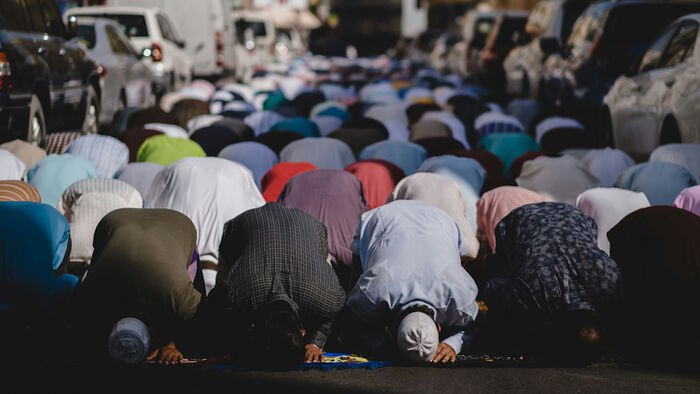2022
For the past fifteen years, the Russian government has been using the idea of Russki mir (Russian world) to target Russophone communities outside of Russia. The example of Germany shows how Russki mir has been able to mobilize Russian-speaking residents for a far-right agenda.
An expert witness team analyzes how civil courts can be effective and risky tools in the fight against violent right-wing extremism. They reflect on their experience in the Sines v. Kessler trial, that brought white supremacist leaders to justice for organizing a murderous, bloody, two-day event in Virginia in 2017. The authors conclude that despite the risks, Sines v. Kessler serves as a critical step forward in combating violent hatred.
Cancelling Pride events due to security threats deals a blow to the LGBTQI community. Across the democratic world, approaches to policing Pride vary remarkably, and security concerns are sometimes used to obstruct Pride celebrations by conservative officials. But there is also good practice.
Improved systematic data on severe far-right violence in Western Europe debunks five common myths in the field.
In recent years, several lone actor terrorists have cited ecofascism as part of their motivation for violence. Such ecofascists have mystically imagined ideas about nature, and claim a sacred and exclusive bond with it, which they simultaneously weaponize to justify harm against fellow citizens.
Recent weeks have shown heart warming European solidarity with the Ukrainian people. Although this response is important and necessary, it provides a stark contrast with the treatment of non-Western refugees in the aftermath of the 2015 ‘refugee crisis’. Iris Beau Segers discusses the role of narratives in shaping these different responses to refugees and highlights the urgent need to address the unequal treatment of people fleeing from danger.
This year marks the 30th anniversary of the Prijedor massacre. While the atrocities in Prijedor are rarely considered relevant history for present day politics, contemporary imaginaries of Europe have been challenged by the Russian invasion of Ukraine. The future security of Bosnia depends on its acknowledgment as part of the European collective.
While much has been written about radical right voters and politicians, few social scientists have systematically engaged with them. But how does one go about interviewing radical right respondents?
Some ethnographers of the far right underscore the importance of approaching research participants with empathy. This article criticizes that perspective and proposes Elaine Castillo’s concept of “inheritance” as an alternative, arguing that inheritance allows us to situate far-right actors' affective investments within a white supremacist, capitalist, heteropatriarchal social formation.
The Russian far-right activist Vladislav Pozdnyakov is largely seen as a marginal character by far-right scholars. However, Elizaveta Gaufman argues that Pozdnyakov and his now banned organization “the Male State” need to be examined more closely as they represent yet another example of a global misogyny trend on par with the incel movement.
Liberal democracy is under pressure, and illiberalism remains a threat across the globe. Cas Mudde argues that key events in 2021 should be a wake-up call to those who think illiberalism is the inevitable future, and emphasizes the crucial need for consistent, genuine, and inspiring liberal democratic politics.
In a recent webinar Ryan Scrivens and C-REX Director Tore Bjørgo weighed in on what we can learn from interviewing former extremists. In discussing some of his recent work with formers, he emphasised a recent study co-authored by Tiana Gaudette and Vivek Venkatesh, which examined the complex pathways out of violent right-wing extremism.
The majority of white Norwegians hold deep-seated racist attitudes and stereotypes, but superficially display egalitarian behaviour, according to Nina Høy-Petersen. In a recently published article, she shows that the duality of human cognition obscures people’s awareness of their own negative stereotypes, and argues that this makes confronting racism difficult.
Extremists, such as far-right nationalists, ISIS, and QAnon conspiracy theorists, are often considered to hold irrational beliefs. By drawing on recent, but underexplored ideas from academic philosophy, Finlay Malcolm will identify three ways by which extremist beliefs might be irrational and suggests how some of these ideas might be useful for research and policy on deradicalisation.
In this post Håvard Haugstvedt examines social workers' participation in multi-agency prevention work against violent extremism. The additional responsibilities cause tension in client meetings in particular, as social workers feel drawn to both their traditional ways of doing business, and to practices more influenced by police and security services. Social workers handle this by using both emotion management strategies, and social support from peers and supervisors.
On April 24, 2022, French voters had to decide on their new president. Although Emmanuel Macron was re-elected with 58.54% of the vote, Marine Le Pen, candidate of the Rassemblement National, had never been this close to winning presidential elections. Indeed, she has progressed throughout the campaign, obtaining a historical score under the Fifth Republic of 41.46% of the vote – an increase of 7.56% compared to 2017.
Viktor Orbán’s Fidesz party wins the Hungarian national elections again, securing a two-thirds majority parliament for their fourth consecutive term.
The Swedish general elections are held on 11 September. This upcoming election in Sweden shows how quickly and willingly mainstream right parties adjust their policies and strategies if the only way to power goes through the far right.
After garnering considerable media attention during its first year, the Alliance for the Union of Romanians (AUR) is dropping in the polls because of the war in Ukraine. The change in media logic is affecting the clout of the far-right party in Romania.
Two people were killed in a shooting at a gay bar in Bratislava on 12 October 2022. While the attack was condemned by Slovak society, a right-wing political establishment struggled to offer support to the LGBTQ+ community.
Despite the electoral implosion of what was considered one the most successful far-right parties in Western Europe - the Danish People’s Party - Denmark remains a stronghold for far-right politics.
Levels of physical violence frequently escalate during waves of far-right or anti-minority protests. Joel Busher, Julia Ebner, Zsófia Hacsek, Gareth Harris, and Graham Macklin examine why, and what policymakers, practitioners, and other stakeholders can do to inhibit this.
The Italian general elections are held on 25 September. A right-wing coalition led by the far right is widely predicted to emerge victorious. Pietro Castelli Gattinara and Caterina Froio explain how Italy got here, and the significance of the expected result.
Exactly 100 years ago, the liberal ruling class in Italy surrendered to the Blackshirts controlled by Benito Mussolini. The ‘March on Rome’ did not happen in the way it has been mythologised. On the day of 28 October 1922, it was enough for the Fascist leader to threaten the use of force, a day which marked the beginning of the ‘fascist era’ in Europe.

RightNow!
Welcome to the “RightNow!” blog where you will find commentary, analysis and reflection by C-REX’s researchers and affiliates on topics related to contemporary far right politics, including party politics, subcultural trends, militancy, violence, and terrorism.
“RightNow!” also provides a platform for republishing op-eds by our core team of experts (with due acknowledgement of course) which have been published by newspapers and on other blogs in order to further highlight the breadth of our work here at C-REX. The articles give the views of the authors, not the position of the Centre for Research on Extremism.
To submit proposals and comments, contact the RightNow! editor Celestine Salomé Kunkeler.
.jpg)
.jpg?alt=listing)

